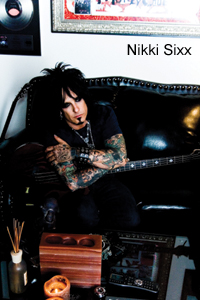Clean ‘N’ Sober

Death is described as the great rock career move, but surviving serious drug addiction might be a better choice. Especially when, decades later and clean ‘n’ sober, you get to regale the public with tales of your sordid past in best-selling books. Among a raft of such having-one’s-cake-and-eating-it-too tomes by rockers touting their tales of dopester depravities are Eric Clapton‘s Clapton: The Autobiography (Broadway), Motley Crue bassist Nikki Sixx‘s Heroin Diaries (Pocket) and Guns N’ Roses guitarist Slash‘s Slash (Harper).
Despite their authors’ contrasting personalities and different musical styles, these autobiographies have much in common. Each focuses on descriptions of the pains and pleasures of devouring vast quantities of cocaine, heroin, alcohol, and various other ingestibles of questionable character. And they are studded with accounts of their authors’ persistent failures to abstain from the innumerable sexual adventures that are the right-de-seignior of rock stars.
Mainly missing in action, or at least given short shrift, is the creation and performance of music. Sometimes, and this is one of them, two out of three is bad. Because all three artists did their best work while deeply addicted, they raise unanswered questions about the relationship between creativity and drugs. But their creativity was also at its peak during their youth, so it might not just be the drugs that were the doors of perception, romantic myths notwithstanding. Perhaps their need for drugs and alcohol is related to their obsessions with music – each in its way has charms to soothe the savage breast. Sex, drugs, and rock ‘n’ roll – are they attempts to plug holes in our souls?
Also absent is how the hell they managed to perform night after night in such an out-of-their-head condition, let alone to remember enough details to write these books. I recall seeing Slash hanging out at Metro prior to a performance of a pal of his in 1989. He was so sloshed he was nodding off and was only vertical because he was held in place by buddies on either side of him. About a half hour later, the headliner called him up on stage. Two people aided him in navigating the stairs, strapped on his guitar and plugged it in for him – he couldn’t have done it himself. And then he started playing – brilliantly, never missing a note.
For all the similarities, these cleaned-up guitarists have created wildly different books, especially in their narrative voices. In contrast to Sixx’s over-the-top, exclamation-pointed, large-font hysteria, Clapton’s tone is almost emotionless. And Slash doesn’t seem to have any personal voice – the words appear far more to be co-author Anthony Bozzo’s. Clapton wrote his book after his dissatisfaction with a co-writer’s version. Sixx’s work is a pastiche of a diary he kept during the year when Motley Crue’s fame coincided with his peak drug use. The entries are annotated by the current version of Sixx and by various and sundry members of his professional and personal entourage, some of whom pointedly contradict his accounts.
Each musician comes from fractured, unconventional, “Oprah”-worthy families. Clapton was raised by his small-town grandparents in straightened financial circumstances. He was told his mother was his older sister – a lie his extended family maintained and he blames for souring his life. He grouses: “The feelings of insecurity I had about my home life made me hate school.” Yet he describes his grandparents – who raised him as their son – as warm and kindly, saying they spoiled him. One wonders how well any of these men understand their lives; Clapton, constantly in the spotlight as lead guitarist and the object of the “Clapton is God” graffiti, writes “I hated anything that would single me out and get me unwanted attention.” Sixx’s childhood found him shuttled from one household to another, feeling unwanted in each. One doesn’t need to know much psychiatry to relate his anger at his mother, full of bile and blame toward her – even now he feels she doesn’t love him – to his indefatigable misogyny. In a weird way, Slash’s youth seems almost charmed. His hippie parents, a British father and African-American mother, moved to California and soon divorced. His mother’s successful costume-design career introduced him to movers and shakers in rock. At age 13 he was sleeping with his girlfriend of the same age at her house, with her mother’s permission and her gifts of pot.
All these rehabbed rockers chronicle gripping early life-stories and celebrity sensationalism. But it is Clapton’s that is ready for the major biopic with a life that is bursting with melodrama, romance, and hit songs. Besotted with his guitar pal George Harrison’s wife Patty, the relationship blossomed into marriage and nine years later wilted in divorce. She reports in her own recent autobiography that Clapton wasn’t fun to be around, though she is rather proud of the songs he wrote for her, especially “Wonderful Tonight.” Years later, his toddler son Connor died, accidentally falling out the window of a New York high-rise. Such is the stuff of Clapton’s life and loves that I’d be astonished if a movie isn’t already underway. His current popularity even provides a sappy-happy Hollywood ending.
– Deena Dasein











